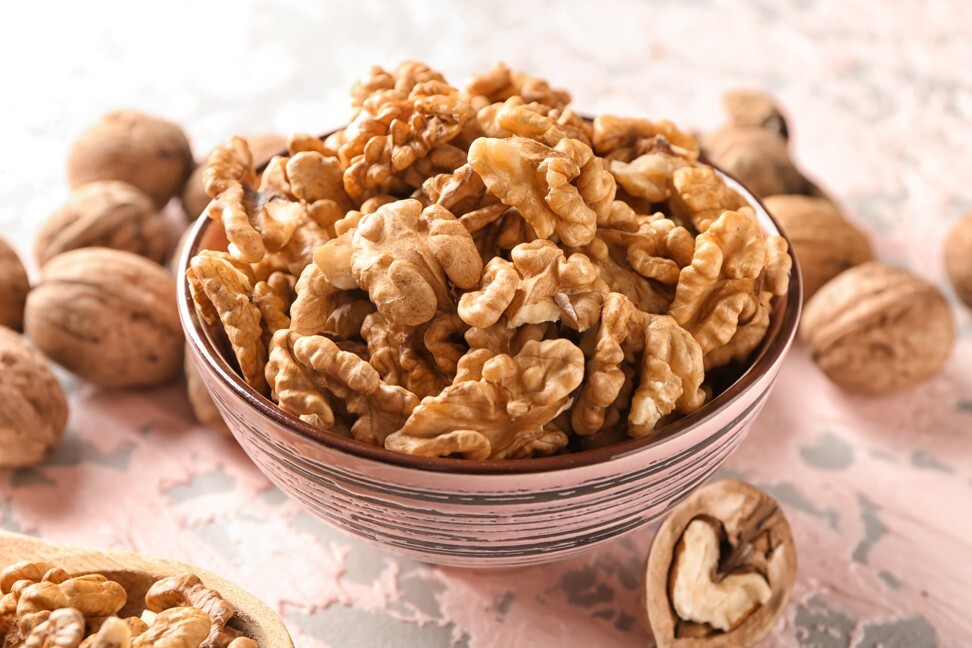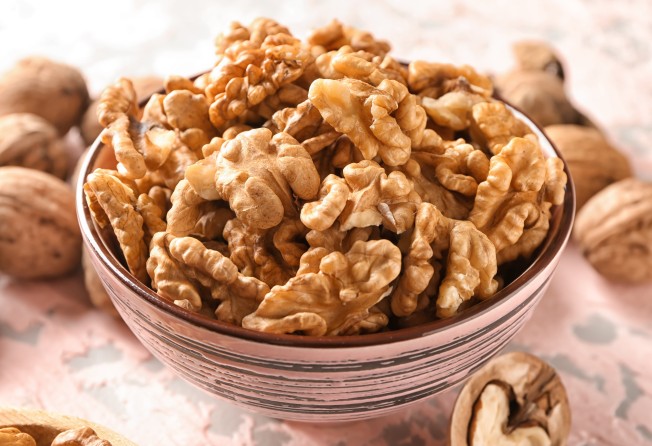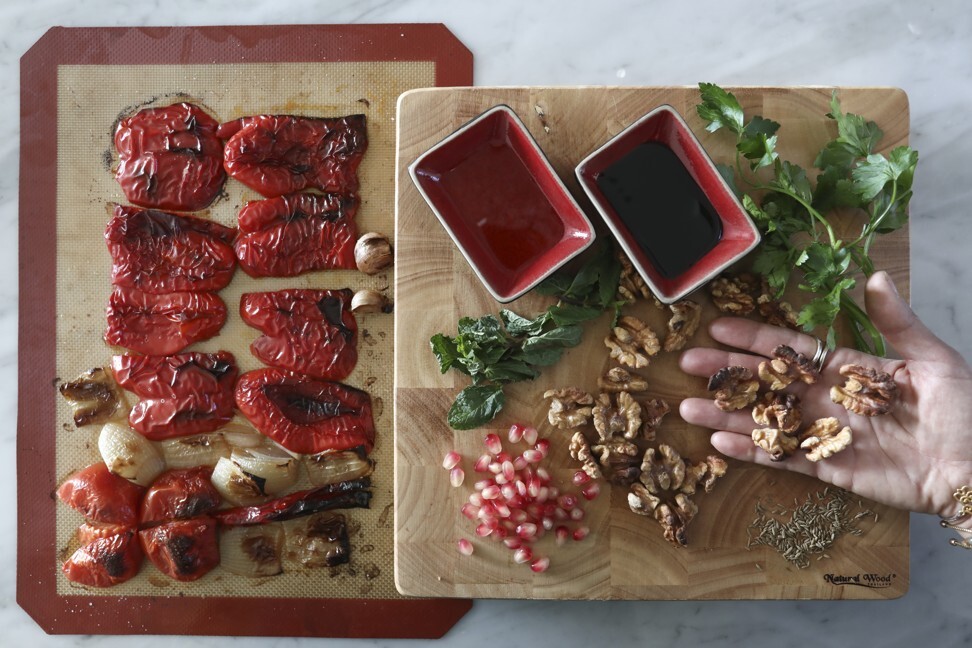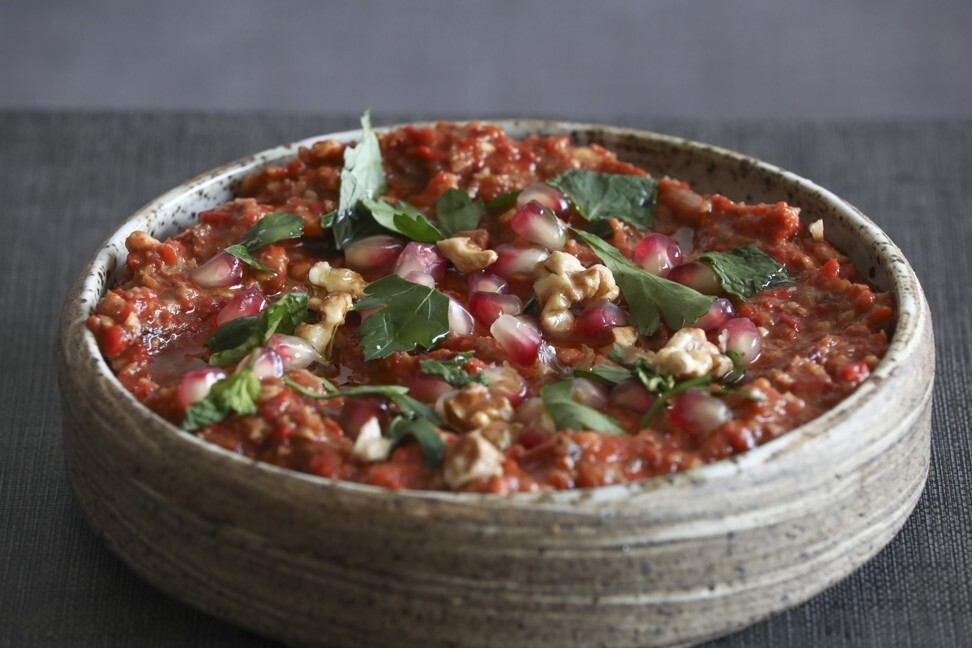
Walnuts: health benefits, how to get the most out of them, plus a walnut-based dip recipe to try this Christmas
- Walnuts have long been accepted as ‘brain food’ and are known to benefit the heart
- New research has found they are great for the digestive system too, aiding in the growth of beneficial gut bacteria and contributing to our overall well-being

Nuts are high in calories, but that doesn’t stop Amy Elkhoury from eating them daily. The long-time vegan, based in Hong Kong, says that nuts keep her full for hours at a stretch, so she’s less likely to snack throughout the day. Because most of what she eats is healthy, her daily nut consumption does not make her gain weight. In fact, the oil from nuts makes up most of her daily fat intake.
Walnuts are among her favourite nuts. Crunchy yet dense, and with a mildly bitter flavour, they add bite, creaminess and earthiness to both sweet and savoury dishes.
“There are endless ways you can use walnuts,” says Elkhoury, who moved to Hong Kong from Montreal, Canada, and recently launched an artisan plant-based “cheese” company called Nuteese.
“I like adding them to my oats in the morning, along with other nuts, seeds and dried fruit. I also pulse walnuts with nutritional yeast to make a Parmesan-style sprinkle, mix them with chopped mushrooms for a vegan bolognese sauce, or combine them with beetroot to make a beetroot burger. For a dessert topping, there’s nothing more luscious than a rich caramel-style sauce, made from walnuts puréed with maple syrup, dates and oil.”

Besides flavour and texture, walnuts offer a host of health benefits for the brain and heart. Karen Chong, a dietitian at Matilda International Hospital in Hong Kong, says walnuts’ high omega-3 fatty acid content makes them a boon for brain function and development, while their monounsaturated and polyunsaturated fat can help lower our risk of cardiovascular disease.
A recent study from Pennsylvania State University in the United States found that eating walnuts every day might be good for gut health, too.
In the study, published in December 2019 in The Journal of Nutrition, subjects who were given a diet of whole walnuts experienced an increase in the number of Roseburia – gut bacteria that have been associated with protection of the gut lining. There was also an increase in Butyricicoccus, a probiotic that supports digestive health.
“Maintaining a healthy gut is very important,” Chong says. “Poor gut health is associated with obesity and chronic illnesses such as cancer, Type 2 diabetes, irritable bowel syndrome and colitis, the inflammation of the inner lining of the colon.
“More importantly, the health of your gut is connected to your overall health. The gut microbiome – that is, the make-up of bacteria and other microorganisms in your stomach and intestines – is complex, and its health has been linked with a stronger immune system, a happier mood, increased energy, and other aspects of physical, mental and emotional well-being.”

Conversely, when someone has an unhealthy digestive system, their sleeping patterns, energy levels and mood may be negatively affected and they might experience insomnia, fatigue and feel low, Chong says. This may make them more susceptible to illness. People with colitis (a chronic digestive disease), for example, have a higher risk of developing anxiety, depression or both.
Like other nuts, walnuts have a good amount of soluble fibre or resistant starch, which acts as a prebiotic that nourishes beneficial bacteria, also called probiotics, in the gut. Probiotics help restore and balance our gut microbiome, which boosts our digestive health, but these live microorganisms cannot survive without prebiotics.
“In addition to nuts, other foods containing prebiotics include lentils, chickpeas and beans, oats, green bananas, Jerusalem artichokes, apples, asparagus, garlic, leeks and onions,” Chong says. “Your diet should consist of a wide variety of whole foods anyway, like fruit, vegetables, beans, lentils and whole grains, since this is what creates a more diverse gut microbiome. Incorporating these foods, or even switching to a plant-based diet, can alter your gut flora profile in just a few days.”
Beyond consuming more foods with prebiotics, you can improve your gut health by eating more probiotic-rich and fermented foods, such as tempeh, natto, sauerkraut and kimchi, getting quality sleep, reducing stress, taking antibiotics only when necessary, avoiding alcohol and processed foods, minimising foods that are high in saturated fat, and eating foods that are high in polyphenols, such as blueberries, plain chocolate and green tea. Polyphenols are plant compounds that are broken down by the gut microbiome to stimulate healthy bacterial growth.
Chong recommends consuming no more than 40g (1½ ounces) of nuts a day. To get the most from your walnut snack, she suggests having the nuts raw or roasted, and without salt, sugar or other sweeteners. You can add ground spices or dry herbs to them to add more flavour.

Festive dip packs healthy walnut punch
Elkhoury uses cashews instead of walnuts for her vegan “cheeses”, which are fermented; walnuts can get mouldy in the fermentation process. To make a “cheesy” dip made from walnuts, Elkhoury offers her favourite version of a Middle Eastern Muhammara recipe in a cream-cheese style.
“I was born in Lebanon and grew up with this smoky-flavoured hot pepper dip,” Elkhoury says.
This easy, creamy-yet-chunky recipe is excellent for holiday entertaining, even if you’re only celebrating the festive season with household members. Serve with crackers, carrot and celery sticks, pita crisps, or crisps.

Amy Elkhoury’s Walnut-based Muhammara Dip
Ingredients:
¾ cup raw walnuts
2 red bell peppers, quartered
1 small onion
2 garlic cloves
1 tomato, quartered
1 small red chilli
2 tbsp olive oil
½ tsp salt
½ tsp cumin seeds (or cumin powder)
1 tbsp pomegranate molasses (you can substitute this with balsamic glaze and a splash of lemon juice)
Pomegranate seeds, fresh parsley and fresh mint, to garnish
Extra olive oil and salt, to taste

Directions:
1. Soak the walnuts in water overnight, to make them easier to digest and remove some of their bitter tannins.
2. Preheat the oven to 220 degrees Celsius (428 Fahrenheit).
3. Rinse the walnuts and arrange them in a single layer on a tray lined with parchment paper. Roast for 10 minutes until fragrant. Remove from the oven and set aside.
4. Arrange the peppers, onion, garlic (unpeeled), tomato and chilli on a baking tray lined with parchment paper. Drizzle with olive oil and sprinkle with salt. Roast for about 30 minutes.
5. In a small pan, toast the cumin seeds over medium heat until fragrant and the seeds begin to “pop” (after a minute or so). Remove from the heat and grind in a food processor or with a mortar and pestle. Note: You can skip this step and just use ground cumin.
6. Once the vegetables are dry and have cooled slightly, peel the bell pepper, tomato and garlic. If you cannot remove all of the peel, no problem – a bit of peel adds extra smokiness.
7. In a food processor, add the roasted vegetables, ground cumin, pomegranate molasses and, if desired, a dash of salt. Pulse a couple of times. Add the roasted walnuts and pulse a few more times. Note: Do not over-process as the dip should have a chunky texture.
8. Transfer to a serving bowl and garnish with pomegranate seeds, parsley and mint. Drizzle with olive oil.
For more recipes, visit SCMP Cooking